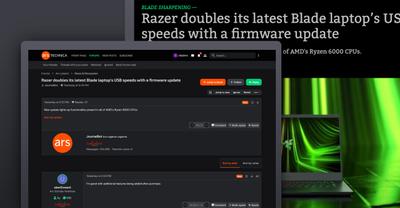Ars Technica
streamlining their readership experience
purpose
For more than two decades originating in 1998, Ars Technica has been serving tech hobbyists and professionals with news coverage and community discussion dedicated to tech, hardware, and tech policy. A pioneer in being one of the first publications to create digital content, Ars Technica has remained a steadfast leader in the tech space building a core readership of 1.4 million and nearly 500,000 community members and later acquired by Condé Nast in 2008.
After two decades in business, Ars Technica was ready to update their legacy software, re-approach their mobile experience, and further improve their overall user experience. Ars Technica approached our team to aid in the update and in tandem offer community strategy and management to ease the transition of the change for their die-hard readers and community members.
services
- data migration
- ux/ui design
- integrations
- community strategy
- WordPress
Audentio has been a wonderful partner for Ars Technica and helped us reimagine our entire forum and article commenting system. The engineering group is a smart, dedicated bunch; the project management team is detail-oriented and consistent. Audentio was able to interface with our in-house development and design expertise perfectly, giving us the right amount of help and guidance. I can heartily endorse Audentio - they get the job done!
community strategy and management
challenges
Being a top choice for news and discussion in the tech space and a household name meant a close partnership with the client and an extra level of attentiveness to our strategy approach from the technical aspect of the migration to setting up a beta team for thorough testing.
After initial onboarding with the client, we consulted on a number of community strategies:
- Consulted on how to organize their discussion for more intuitive discovery
- How we would handle the custom WordPress integration between their comment system and the new XenForo forum software for in-sync and seamless discussion
- Created a beta team of testers from their staff that would assist with testing and later become brand ambassadors and supports of the new features
- Migration to new software
integrating reader comments between WordPress and XenForo
challenges
A vital part of what makes Ars Technica is the reader discussion between members and a long-standing challenge was that the comment system suffered from a disjointed experience from the WordPress editorial side and the community side. The custom-built comment system shared a data source so the comments between the articles and the forum were synced but past shared data, the two experiences were very much different.
The interfaces were not consistent and behaved differently with the moderation for their internal team also being different between the two softwares. With the disjointed experience, Ars Technica had started to identify most readers only discussing on their editorial articles and community discussion had stalled.
our approach
Closely with their engineers, we acted as the product consultant the need for keeping two different softwares systems in sync and instead treat XenForo as the single source of truth.
How this improved not only in a technical aspect but also for the user experience:
- Less cumbersome to maintain and update the comment system
- Consistency in behavior and UI was easier to achieve by relying on the familiarness of XenForo
- Avoid user confusion when navigating between articles and community
- Easier for Ars Technica staff to moderate
integration strategy
With a user sync and iframe approach, the new comment system was able to deliver:
- Automatic thread creation on the community when a WordPress article is posted
- Embedded thread discussion for a single consistent behavior
- Theme consistency between XenForo and WordPress so the familiarity of the editorial site is always held
- Support for light and dark mode
migrating from legacy phpBB to XenForo
data migration
Not unfamiliar to migrations from legacy software and coupled with a large user base and data, our devops team approached the process with extensive testing and custom importers to ensure that all user and content data transferred correctly.
Our multiple test migrations before go-live allowed us to more accurately estimate the downtime and make small improvements to our migration script. Along with the engineers at Ars Technica, we created a plan with the client to do an overnight migration to minimize the time for their readers and have a more seamless experience the day of go-live.
go-live process
A thorough quality assurance check before starting the migration, our devops and support team were on hand through the process and thereafter to communicate openly about the status to community members and address feedback.
Overall the launch was successful with minor downtime and a positive community reception with our team remaining active and extremely attentive to user feedback post-live.
Since going live with the update, we've monitored how the community has progressed and here's a look at metrics comparing pre-launch to three months after.
28%
16%
12%
24%
“I’ve been here like 21 years. I really like the new upgrades. It’s like ‘the same, but better.’ In a world full of excess tech you managed to make it better while avoiding useless features and pointless transformations for the worst. Well done.”
“The functionality upgrade is absolutely off the charts compared to the old software. The most important thing is that everything worked, and kept working as the load ramped up. You and the entire team working on the forums can take a deep breath; sure there’s things to fix — there always are — but you can tackle things at a reasonable pace rather than racing.”


